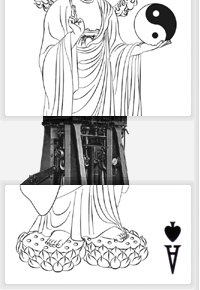張彧暋﹕民主可能不是什麼 (from HK Mingpao, Nov. 10, 07; Essay to follow my Comments)
Comments: The author explores in this Essay the mutual implication of democracy and a collective sense of empowerment, the failure of one, hence of the other, being in his view "香港社會問題的癥結." Democracy, to be true, must, according to that view, be more than a matter of the ballot; it must be something that, within the bounds of modern social life, approximates nevertheless the collective enchantment sufficient to give rise, in primitive groupings, to a totem. No more trance; but festivities, assemblies, demonstrations, confrontations, or sit-ins, vigils, etc. Democracy, in this conception, flows not from Mill's Representative Government but from Durkheim's Elementary Forms; it is high-energy politics announcing and actualizing collective self-determination.
One difficulty with this conception--and here I do not mean thereby to underrate the truth this conception is to offer--is that high-energy politics is usually not sustainable on a large scale beyond a few decisive moments: even primitive men and women could not go into trance all the time. Things will, and have to, cool down. Does that imply then, that, in the normal course of things, a collective sense of empowerment must be elusive, if that sense be built upon these rare-to-have decisive moments? A nation with an honorable history of high-energy politics, not to say strikes and revolutions, need not be one wherein the people will not feel disempowered. France (a rather democratic case), say, or various countries in Latin America.
If democracy of the festivity sort need not promise a collective sense of empowerment (beyond, again, a few decisive moments), then perhaps a collective sense of empowerment need not come from democracy either. Think of the early days of the PRC--I mean the early 50s. That sense might not be sustainable in the long run either; for it comes, not from democracy, but from a sentiment that there is a project, a vision, a future, such that each person's contributing thereto genuinely confers meaning to his or her present work; a collective sense of empowerment hinges not upon the collective exercise of (political) power, but upon the collective participation in a meaning-conferring enterprise.
I submit that in the long run meaning is even more fundamental to the sense of empowerment than democratic festivity is; but that in the long run meaning, or the search for meaning, might depend on things much more mundane: work satisfaction, life quality, risk insurance, leisure, cultural activities, entertainment, some overall perception of the society's health, etc. Democracy of the festivity sort might add to the appeal of these good things (now that they are my creation); but at the end it is the having of these things that is crucial for most people; and such having, democracy cannot promise.
It is tempting to argue, that the fundamental problem of HK is political--lack of democracy. But sociologists--and the author of this Essay is himself one--have long suggested that long-wave economic changes are no less part of the story. Can a change in politics bring about an improvement in the economics? I am not so sure. But absent an investigation into this question, further stress on the political being 香港社會問題的癥結 may be a little distracting. - Y.T.
【明報專訊】在社會學的導修課上,我問同學,你要是研究一個你自己真正關心的課題,你研究什麼?有幾位傳理系與社會系的同學答:「民主普選問題!」我說:「你講笑吧?」其他同學就咯咯大笑起來。理由呢?大家真正關心的,莫非感情、考試、選科、飯堂、還有校園交通問題。
在香港談民主與愛國,其實沒有什麼令人覺得真切的反應。可是我們還得談一談,因為這關乎我們生活在現代社會中,該如何排除個人的孤獨感的問題。西方政治思想史中自由與民主兩個概念,本來就不怎麼調和,更何香港社會一直以前者作為核心價值。可是,縱使民主毫不關乎我們的日常生活,要是只談自由不談民主,我們將會面對集體的失落與無力感,而這正是香港社會問題的癥結。
民主是一種集體與神聖的社會祭典
早陣子特首的民主 文革論,錯在哪裏?這其實是很簡單的邏輯問題罷了。「很多/凡民主運動都是集體行為」,並不能引伸出「凡集體行為都叫民主」。集體地看煙花、新年倒數,我們都不會叫做民主。單靠「很多人一起亢奮地進行集體活動」這點,不一定是民主。
另一方面,民主必然是集體性的。雖然跟現代意義的民主不同,看看希臘雅典就知道,為什麼民主必須是一種人們透過自發參與的集體活動。幾千名雅典公民運用個人意志,在面對巴特農神殿的廣場聚集,然後全民議論、投票,全體意志統一了以後,形成一道強烈的「社會氣流」,而柏拉圖所說的「哲人王」,就是能上通諸神意志,下通全體世俗的統治者。而無論在古代西方、中國以至日本,政治本來就是祭祀天地之事。古希臘民主也類近宗教祭典,不過是以全民參與的方式進行。在此,希臘人找到自己在群體中的存在感。
可是,民主主義跟演唱會的最大不同是,每個人都是發自內心,為了一個公的利益而D動參與,講出自己真心相信的意見,互相討論與說服對方,而並非文革中互相欺瞞的情。因此,民主的理想狀態就是在投票日全體市民都抱興奮與熱切期待的心情晨早去投票。對於從未以個人力量爭取到政治改革的社會來說,這當然很困難了。
大江健三郎在1960年日本戰後最大的民主運動安保抗爭的時候,寫了這段文字:
「日本年輕人之所以對日本人失望,是因為他們沒有真正感覺到自己能參與建設國家。日本的政治,只是在大家能力範圍之外的地方進行,因此大家唯有放棄參與政治。這兩種感情,只是建基於一種前提之下,那就是日本還在美國的支配之下,能決定日本的命運的並非日本人自己的意志。於是,日本年輕人從心底絕望、從根本地對政治毫無關心。要令大家面對這種現實,必須首先不害怕認識這個事實。要回復日本年輕人對國家的熱情,其實是很簡單的,那就是必須令日本不成為外國的基地。」 (《戰後青年的日本復歸》)
那一年,戰犯首相岸信介,聽隨美國的指示,無視日本人的意願,強行通過日美安全 保障的相關法例。也就是那一年,幾十萬日本人自發的走上街頭遊行,包圍國會。
香港又是如何的呢?我們必須回到過去的遊行歷史,感受這種集體氣流與神聖的祭典。因此,我們討論香港民主的起點,並非投票箱,而是兩次七一祭典之後的茫茫旅途。
Comments on 張彧暋's Essay "民主可能不是什麼"
標籤:
Y.T.
訂閱:
發佈留言 (Atom)



1 留言:
香港人要民主,但係又唔關心政治、政策同民生議題,咁要民主做乜呢?當然,我唔係話完全冇,只係比較少,好少。每當我去問同學對時事嘅睇法時,我都要鼓起勇氣,因為我知道有好大機會會係錯愕、冷場。但係唔問又點知呢?(我覺得有興趣嘅人係有嘅,但係就散佈喺香港嘅唔同角落,而且各不相識。有啲就一直收埋喺個心度,怕講出嚟會俾人笑。)
咁唔關心政治、政策同民生議題嘅人爭取民主做乜嘢呢?我諗就係想要換特首嘅權力。喺我認識嘅人當中,包括我自己在內,都有一種決策依賴性,希望有人幫自己出主意,承擔風險。學生去補習,其中一個原因就係因為佢地包攞A,C,E。我地心入面都知所謂"包攞"最多都係退錢,但係我地寜願將權力交俾補習社,失敗之後賴補習社,都唔肯承擔自己教自己嘅風險。我覺得有一部分香港人都抱住噉樣嘅心態嚟睇民主。選一個特首出嚟,從此不聞不問;香港經濟唔好嘞,就賴晒佢,拉佢落嚟,選第二個。咁樣其實唔係民主,而係反民主,根本解決唔到問題,係自欺欺人。
發佈留言